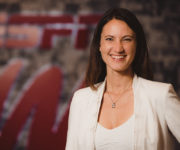Meet the Match
A Rugby Legend Strives to Get More Women in the Game
Melodie Robinson was destined to be a rugby player. Both her great-grandfather, a Maori All Black, and uncle, an All Black, had represented New Zealand in international competition. But, women were not encouraged to play the country’s most popular sport when Melodie was young. For a time, it looked like she might not be able to continue their legacies.
Instead of rugby, Melodie played volleyball and basketball until she reached university. But, with tryouts announced for a women’s rugby club, she and about 60 other young women decided to give it a shot. From the first whistle, she fell in love.
Fast forward a few years and Melodie was one of the more recognizable female faces in the world of New Zealand rugby. From 1996 until 2002, she won two World Cups with the Black Ferns, the women’s national rugby team.
“The bonds you make with someone on the rugby field are stronger than any other sport I’ve played,” Melodie says. “You’re using your strength and will to physically dominate another woman on the field—that is empowerment.”
Rugby gave Melodie a taste for success and a window into a new life. “Sport is a vehicle to reach your aspirations,” she says.
The ambition and drive from her rugby experiences helped Melodie transition into a successful career in journalism. After completing a bachelor’s degree in physical education from the University of Otago, she returned to complete a post-grad certificate in journalism (Melodie is currently completing her MBA at Auckland University). By 2002, she was working 80 hours a week hosting a breakfast show and coaching rugby when she was given her first sports role with Sky Network Television.
Even though she is a respected voice in rugby—the only female journalist, presenter and commentator for Sky Sport and a former co-host of the World Rugby Awards—Melodie still deals with unfair criticism due to her gender.
“I remember my first game, I made an error and the whole conversation was about, ‘Why do we have a woman talking about rugby?’” Melodie says. “That taught me a lesson about preparing more than anybody else. It doesn’t matter if you’re a male and All Black and you do something wrong, but it does if you’re a woman.”
Although stereotypes and social inequity exists, New Zealand is a notably egalitarian society. In addition to strong female role models, New Zealand was the first in the world to give women the right to vote, and has had two female prime ministers. Despite these accomplishments, many people still hold traditional views of women’s roles, which do not include sports.
Melodie wants to push for an exclusively women’s sports show on Sky Sport geared to celebrating the country’s rising number of female athletes, similar to espnW’s online platform in the United States. She is a self-proclaimed “pain-in-the-butt for her bosses” and is constantly advocating for bigger and better coverage of women’s rugby competitions. Her prominent role covering women’s sports has led to an increase of “on air” features on women and a pathway for women to talk about sports. Current players tell her they would like to transition into journalism to follow her footsteps.
“I’ve lived my passion and you can’t really say working in rugby is a real job,” Melodie says. “I’ve been living my dream for 13 years.”
Working with Melodie to achieve her goals will be Julie Sobieski, vice president of league sports programming for ESPN. For years, Julie has been one of the company’s key programming executives, leading negotiations for the network’s 2014 extended agreement with the National Basketball Association (NBA) and overseeing strategic planning and management of the its relationships with the NBA, Major League Baseball (MLB), NASCAR, and more. Like Melodie, she has been a champion for women in sports media and was elected to lead ESPN Women, the company’s employee resource group charged with making the media outlet the premier organization for women in sports, media and business. With Julie’s support, Melodie will be able to develop the tools she needs to become a stronger communicator to stakeholders and influencer in her workplace and throughout New Zealand.

